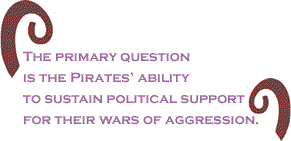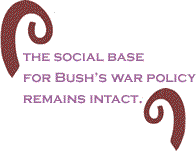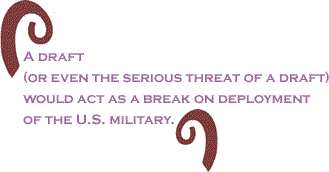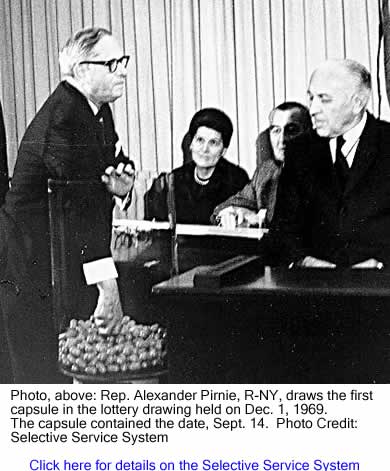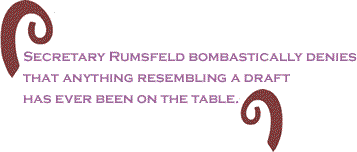
|
|||||||||||||||||||||
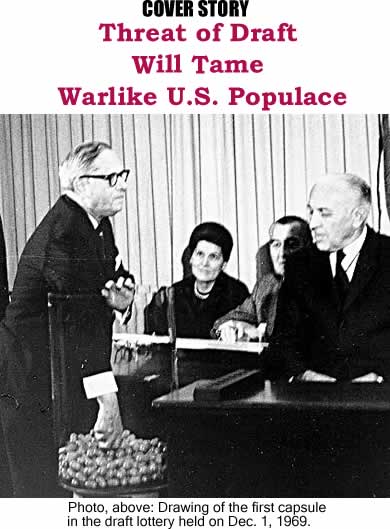 |
The debate on the draft, to the extent it exists, focuses too heavily on the U.S. military crisis in Iraq and far too little on American domestic arrangements that enabled the Bush Pirates to launch their War Against All, in which Iraq was supposed to be only the first, triumphal episode. Although it is unquestionably true that Iraqi resistance has strained U.S. forces to the breaking point – compelling the Bush men to torture their own soldiers with extended tours of duty and to prepare a selective draft of citizens possessing special skills – it does not follow that a draft will rescue the Bush/Cheney/Rumsfeld Grand Plan. Quite the opposite: a universal military and national service draft such as proposed by Harlem’s Charles Rangel and a small group of other congressmen would utterly wreck the social compact that makes endless war politically possible, by forcing Americans to ponder the consequences of U.S. foreign policy to their own families and friends for the first time in 32 years. Anti-war appeals based on morality have only marginal impact on those who believe they are the living embodiment of human civilization – or even God’s plan on Earth. White America is largely unmoved by the deaths of foreigners, especially people of color. Indeed, a huge slice of Euro-Americans actively revel in punishing dark people in lands they cannot find on a map – a vicarious thrill experienced from a great distance. Although support for the Iraq war has declined from a little over three-fifths of the general public in the weeks just before the invasion, to about two-fifths at the time of Bush’s second inauguration, it seems clear that the slippage is due more to disgust at the administration’s endless blunders and lies, than to revulsion at the treatment of Iraqis under occupation.
From the beginning of the
aggression, there has been precious little empathy for Iraqis
among American
whites. A Zogby-Atlanta Journal-Constitution poll conducted in
February 2003, six weeks before Shock and Awe commenced, found
that 62 percent of whites and 60 percent of Hispanics supported
an invasion, but only 23 percent of African Americans did. But
the most revealing responses came when Zogby pollsters asked: “Would
you support or oppose a war against Iraq if it meant thousands
of Iraqi civilian casualties?” As we reported in
Bush’s social base gave him their mandate to slaughter innocents. There has been no evidence of general revulsion at the flattening of Fallujah, or the near-destruction of Najaf. The “German excuse” – that the public was not aware of the atrocities – doesn’t wash, since these crimes against whole cities received ample coverage in the mass media.
Spikes in American casualties during the battles for Najaf and Fallujah did cause support for the war to dip. However, according to a Scripps Howard News Service survey conducted this month:
Only about 40 percent of respondents got within 500 of the death toll, which stood at about 1,450 at the time of the survey. Recent polls indicate
that a majority of the 70 percent of America that is white
still support the
war – that is, the social Two years of polling indicate that, 1) at least half of white America condones (or cheers) war crimes against Iraqis, 2) much of the opposition to the war is weak in intensity, and 3) the public feels, in general, only distantly connected to the war, or to the soldiers who are fighting it. All three outcomes are directly related to the all-volunteer nature of the U.S. military. After a generation and a half without a draft, the citizens of the world’s hyper-aggressive, sole superpower, packing more armaments than the rest of the planet combined, have only the most tenuous links to their armed forces. A fraction of American families contribute members to the military, drawn from Black America (22 percent), Latino America (less than 10 percent) and mainly small town and southern whites from the mid to lower income groups. The remainder of U.S. families do not feel directly “at risk” and may therefore cheer, bemoan or ignore U.S. military adventures from the psychological distance of their choosing. A true national dialogue on war
Congressman Rangel’s office says he
will resubmit his draft bill “in a couple of weeks.” Creation of a volunteer
force in 1973 solved a number of critical problems for U.S.
military and
civilian war planners. The officer class had emerged from Vietnam
totally traumatized by its experience with what was a largely
Black and poor ground force, especially in “line” combat units.
This “Black Street Army” (see Contrary to the received wisdom of many past and present anti-war activists, the top brass welcomed the end of the draft, as did their civilian counterparts. By offering much better pay and living conditions in a scaled down force, the Pentagon was able to methodically shape the military it desired. Escape from the ghetto to the barracks became increasingly difficult in “peacetime” as recruitment standards were raised (just in time for the onset of mass Black incarceration as national policy). The combat arms of the Army got whiter – and later, more heavily Latino. As a result of selective recruiting combined with discrimination in the private sector, African Americans entered the military with higher scores and better qualifications than whites, resulting in Black clustering in support units. The days of the “Black Street Army” in the combat arms were definitively over. Selective recruitment and racially tailored standards yielded the desired political results for both commanders and civilian war makers. Increasingly, the Red (and redneck) regions and districts were supplying the bulk of military manpower. (The exception is Army women, over half of whom are African American.) According to an exhaustive 2003 study by the New York Times, by 2000 42 percent of enlistees came from the South, as opposed to only 14 percent from the Northeast. The political attitudes of the officer class hardened, as well. The NYT study reported:
The full-time military is led by Right-leaning officers and staffed by whites from conservative, smallish places and politically marginal Blacks and Latinos. Civilian war planners believed this was an ideal mix: a relatively small force whose family connections did not effectively penetrate most of the body politic, particularly the influential sectors of society. If missions went awry, only a fraction of the citizenry would have a personal stake in the matter – and a politically weak fraction, at that. In other words, the force was eminently deployable. The military-industrial-complex also favored a smaller, but much more high-tech, military – that’s where the huge contracts come from. Secretary of Defense Donald Rumsfeld held the same job under President Gerald Ford in 1975 and 1976, the formative years of the “fewer boots, bigger bang” all-volunteer project. By 2003, the strategy had morphed into Shock and Awe and the (racist) delusion that a small force of wired soldiers could pacify Iraq and then march on to Iran, Syria and beyond. Bush’s Catch-22
The Iraqi resistance has succeeded in bringing the high-tech, all-volunteer U.S. Army and Marines to the brink of collapse, causing the Bush men to utterly shred the spirit of the contract with the Reserves and National Guard. The Bush regime confronts a classic Catch-22. Having exhausted the existing system’s human resources (despite the hiring of highly expensive mercenaries from around the globe), they must somehow secure a quick and general infusion of new manpower or abandon the Iraq mission as currently deployed. But a general draft – or even the perception that such was imminent – would almost immediately cause the social base for this war to implode. Thus, Secretary Rumsfeld bombastically denies that anything resembling a draft has ever been on the table. “…the idea of reinstating the draft has never been debated, endorsed, discussed, theorized, pondered or even whispered by anyone in the Bush administration,” lied Rumsfeld, quoted in Tim Dickinson’s superb January 27 Rolling Stone article, “The Return of the Draft.” Instead, the administration explores involuntary call-ups of citizens with “special skills, such as medical personnel, linguists, computer network engineers, etc.," according to a Selective Service memo revealed under the Freedom of Information Act. The Rolling Stone report continues: “The memo then proposes, in detail, that the Selective Service be ‘re-engineered’ to cover all Americans – ‘men and (for the first time) women’ – ages eighteen to thirty-four.” That’s a lot longer than Rangel’s bill, which would affect all citizens of both sexes from age 18 to 26. And the Selective Services’ targeted skill sets typically emerge from very vocal, rather than marginalized, classes – a no-go for this war, which is supported by only a slim majority of white people. As a practical matter, and with the Iraq clock ticking toward an unknown zero hour, the Bush regime has no choice but to hold the lives of current uniformed personnel hostage. “The Pentagon has…involuntarily extended the enlistments of as many as 100,000 soldiers,” under the “stop loss” policy, writes Dickinson. Forty thousand National Guard troops in Iraq “have been informed that their enlistment has been extended until December 24th, 2031.” There is actually a perverse and evil poetry in threatening to retain soldiers for 27 years. In World War Two, soldiers served “for the duration.” Bush envisions constant warfare until the “enemies of freedom” are vanquished, everywhere – a war whose “duration” could stretch beyond the horizons of imagination. Anti-draft but pro-war
The situation on the ground in Iraq has long been beyond U.S. control, and even a selective draft could not save the monstrous mission as originally conceived. Yet the Pirates are determined to continue their eternal offensive by any means at their disposal as long as there is no domestic check on their freedom of action. Where there is not enough manpower, they will use airstrikes, as during the long lead-up to the assault on Fallujah. If they cannot invade Iran or Syria with conventional U.S. columns, they will deploy proxies and special forces, backed by aircraft and missiles. The Rolling Stone’s Tim Dickinson notes, correctly, that a “societywide
draft would…make it more difficult for politicians to commit
troops to battle without popular approval.”
Short of a global catastrophe, the only force on Earth that can pull the plug on the Pirate project, is an aroused American people. Yet the vast majority of the public perceive no direct stake in foreign policy; they either applaud or fail to decipher the codes of war-talk, because “the bulk of this cocooned population, which has the power to extinguish the species, cares only about itself. Before they will embrace humanity, they must first be given cause for personal anxiety. A draft is both moral and a practical necessity, if there is to be any impediment to Americans' second-hand, long-distance, mass killing sprees.”
Let’s be clear: an anti-draft movement is not necessarily an anti-war movement. This is evident in the February 14 press release of Mothers Against the Draft (MAD):
No less a rightwing celebrity than Phyllis Schlafly, national President of the conservative Eagle Forum, recoils at the thought that people from her own circles might be subjected to conscription. “If America wants to remain a free nation, we must reject all proposals for a military draft. Liberty cannot coexist with involuntary servitude.” Schlafly, and doubtless many others whose support is sought by MAD, have no problem with the Iraq war, as long as small town white folks, Latinos and Blacks “choose” to fight it for her. It is precisely this 32-year-long ability to opt-out of war – while voting for it – that makes the nominal U.S. democracy so dangerous. The Schlaflys of this world must be forced to “choose” between withholding support for U.S. adventures, or risking the lives of their own kith and kin. Only then will we witness a real national dialogue on war and peace – among people who are all stakeholders in the balance. A twilight struggle When we first endorsed HR 163 just before the invasion of Iraq in 2003, readers argued, essentially, that the rich will always find a way to avoid national service. Not easily, under this bill. Rep. Pete Stark (D-CA), co-sponsor of the legislation along with Rangel and Representatives John Conyers (D-MI), Jim McDermott (D-WA), John Lewis (D-GA), and Neil Abercrombie (HI), explained:
We have no illusions that national service will come anytime soon. However, the Pirates’ strategy is one of constant escalation, as they attempt to shatter world order and then replace it with their own edifice. Hyper-aggression tends to accelerate the political process. Talking in war-code to a Parisian audience, Condoleezza Rice made it clear that she sees warfare throughout the entirety of our lives: “If we make the pursuit of global freedom the organizing principle of the 21st century, we will achieve historic global advances – for justice and prosperity, for liberty and for peace.” The primary question is not the Pirates’ ability to sustain particular military operations of one kind or another, but their capacity to sustain political support for their wars of aggression. At this stage in U.S. history, a draft would break their backs. |
| February 17 2005 Issue 126 |
|||||||||
|
|||||||||
|
|
|||||||||
| Printer Friendly Version | |||||||||
 |
|||||||||
 |
|||||||||
| |
|||||||||
| |
|||||||||





















